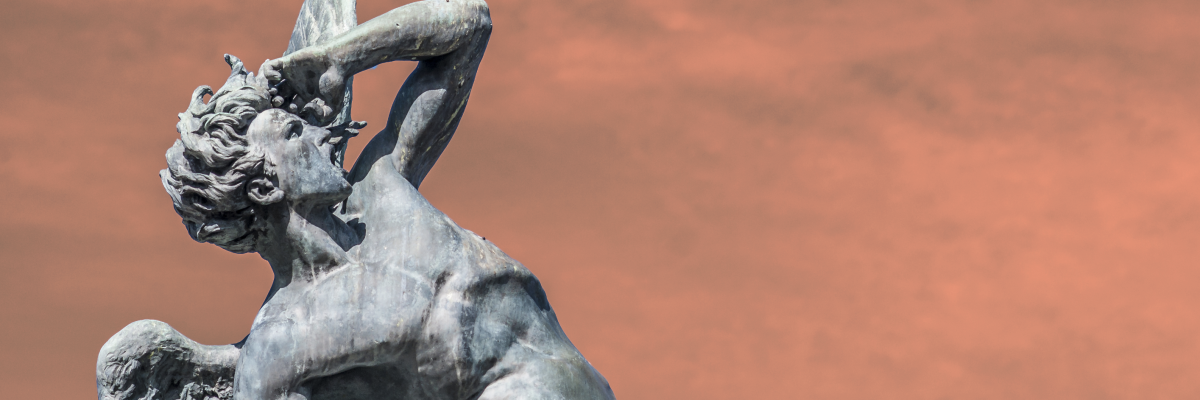
Someone once told me, “God is in the business of redeeming, and everyone is redeemable.” In a general sense, I agree with this. The Bible says the God sent his Son to save the world (John 3:17). So God is able to redeem anyone. But just what is the extent of the “world” and “anyone?” Can God redeem even a demon, or, extending this a bit further, can God redeem Satan?
It’s not a bad question. We have a God who is all loving, who made everything, and whose omnipotence enables him to do anything with that creation. Then our question is: is it possible to redeem someone who is absolutely opposed to good?
The easy answer is tricky. And there are several reasons why.
Satan is wholly opposed to God
Satan is a demon, and demons are fallen angels. The angels were made in order to serve God—to be, as the inspired author of Hebrews puts it, “ministering spirits sent forth to serve, for the sake of those who are to obtain salvation” (1:14). Since the fall, Satan became the prince of demons (Matt. 12:24), ruler of the darkness (Eph. 6:12), and the “god of this world” (2 Cor. 4:4). The devil is absolutely opposed to good, which is why John the Evangelist describes him with the following vigor:
You are of your father the devil, and your will is to do your father’s desires. He was a murderer from the beginning, and has nothing to do with the truth, because there is no truth in him. When he lies, he speaks according to his own nature, for he is a liar and the father of lies (John 8:44).
The Bible is clear that the devil is utterly opposed to God. This is important, because we identify God’s essence as perfect good (Summa Theologiae part I, question 6) and perfect love (part I, question 20; 1 John 14:16). Theologically, God’s essence (his nature) is his existence (I, 2; 3). If Satan is opposed to good, then he is opposed to God’s existence. Therefore Satan is entirely opposed to the good of redemption, of salvation.
Can Satan (or any demon) repent? No. Let’s look at the reason for it.
The decision of the demons is final
To understand the finality of Satan’s decision, we need to look into the nature of the angels and demons. The angels and demons have made their decision either to stay with and serve God for all eternity or to rebel against him for as long as they can. The finality of the demons’ rebellion is due to the binding nature of their decision. The Catechism puts it this way:
It is the irrevocable character of their choice, and not a defect in the infinite divine mercy, that makes the angels’ sin unforgivable. “There is no repentance for the angels after their fall, just as there is no repentance for men after death” (CCC 393).
To understand this argument, we need to understand their free will. It might surprise some readers that man is not the only being in creation to receive free will, but he isn’t: the angels enjoy free will as well. St. Thomas Aquinas says, “Free will is part of man’s dignity. But the angels’ dignity surpasses that of men. Therefore, since free will is in men, with much more reason is it in the angels” (part I, question 59, article 3).
So, if the demons (who are angels) have free will, don’t they have the free will to repent? No. Here’s why: man’s will is moveable, which means, in philosophical terms, changeable. Our wills are not final—while we’re alive on Earth, they can change. We can move away from God, and then later convert our hearts (and wills) back to our Master. Angels, though, can’t change their minds. Why? Two reasons: They understood the world and their decisions immediately—according to Thomas Aquinas, they have no active and passive intellect (I, 54, 4)—and the exercise of their free will is instantaneous and final.
[M]an’s free will is flexible to the opposite both before and after choice; but the angel’s free will is flexible [to] either opposite before the choice, but not after. Therefore the good angels who adhered to justice, were confirmed therein; whereas the wicked ones, sinning, are obstinate in sin (part I, question 64, article 2).
You might still wonder, “But what about 1 Timothy 5:21, which says, ‘In the presence of God and of Christ Jesus and of the elect angels I charge you to keep these rules without favor, doing nothing from partiality’?” Just as “elect” and “predestination” do not prevent the nature of free will for man, it does not for the angels and demons either. The decision of the demons—and therefore Satan—is final.
The nature and character of Christ’s work
Perhaps the most important part of this conversation is understanding that Christ did not die for the demons. His death was for mankind, which is why he became man in the Incarnation and not an angel (part III, question 1, article 1). St. Paul reminds the Romans:
While we were yet helpless, at the right time Christ died for the ungodly. Why, one will hardly die for a righteous man—though perhaps for a good man one will dare even to die. But God shows his love for us in that while we were yet sinners Christ died for us (Rom. 5:6-8).
And the also to those at Corinth: “For as in Adam all die, so also in Christ shall all be made alive” (1 Cor. 15:22).
Remember, on Calvary, Christ defeated Satan. Not only is he defeated—he’s on a short leash. We do not say this in a gullible sense of hope, or an enhanced feeling of confidence: we say it with complete knowledge. Our Catechism says:
The power of Satan is, nonetheless, not infinite. He is only a creature, powerful from the fact that he is pure spirit, but still a creature. He cannot prevent the building up of God’s reign. Although Satan may act in the world out of hatred for God and his kingdom in Christ Jesus, and although his action may cause grave injuries—of a spiritual nature and, indirectly, even of a physical nature—to each man and to society, the action is permitted by divine providence which with strength and gentleness guides human and cosmic history. It is a great mystery that providence should permit diabolical activity, but “we know that in everything God works for good with those who love him” (395).
The theological lesson here is also practical: we’re privileged to have a chance to repent every day of our lives, and the superabundance of grace in the sacraments enables us to be reunited with Christ and freed from the snare of sin. But don’t pray for the devil—pray for the salvation of the living and those in purgatory.



